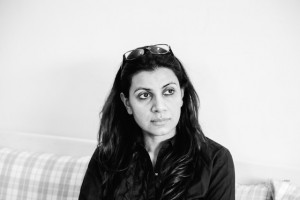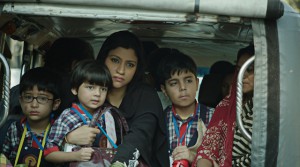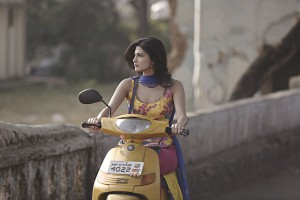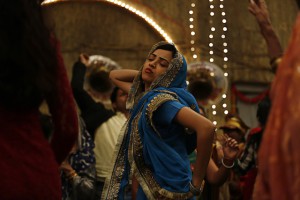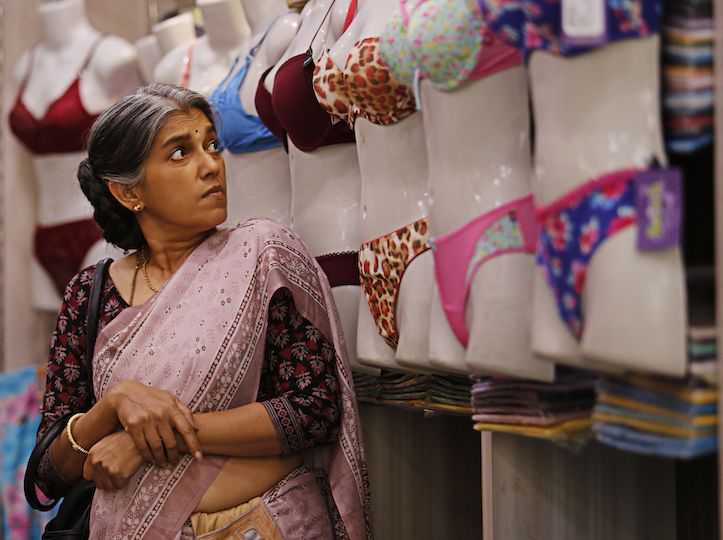
Alankrita Shrivastava is an Indian film director and writer and has been associated with filmmaking since 2003. She was an assistant director to Prakash Jha for films such as Gangaajal (2003), Apaharan (2005) and Raajneeti (2010) before making her directorial debut with the film Turning 30!!! (2011). In her films, Alankrita has been committed to telling stories about women from a woman’s perspective. Her second and most recent film Lipstick Under My Burkha (2016) has received international recognition and is slated to release in India in early 2017.
Anjora Sarangi: You have made two films now that are centred on female protagonists and focus on female friendships, exploring sexuality, and breaking stereotypes. Would you call yourself a feminist filmmaker?
Alankrita Shrivastava: Of course, I am not just a feminist filmmaker, I call myself a feminist and this comes into my writing. It is a politics that feeds into how I look at things and therefore how I write my characters, and so it gets reflected in my films too.
Anjora: What are the underlying issues that concern you which you try to keep in the backdrop or try to incorporate in your films?
Alankrita: It is never as planned as that. I don’t think I have certain issues in mind and then build characters around them. I don’t go in with the notion that I have to make a feminist film. I am a filmmaker so I want to tell stories that interest me. I want to write about characters that I would like to explore. I feel that in the very characters I want to explore and the stories that I want to tell, my politics comes through.
Anjora: Your film Lipstick Under My Burkha is making waves globally! Tell us what inspired you to make this film.
Alankrita: I sometimes feel I am repressed at some level, and not fully free. Something keeps holding me back from within. I used that feeling to create four characters of different ages from small town India. I think my struggle of feeling suppressed as a woman was more internal whereas in my film I have tried to represent a struggle that is both internal and external for the characters.
Anjora: What does the name “Lipstick Under My Burkha” represent?
Alankrita: The film would not have existed without the name. I never had to think of the name, it just emerged. It was probably because I was thinking about hidden desires. The title is not a literal one for me. It is clearly a metaphor for the fact that there are things that we as women tend to suppress, things which we keep hidden because society etches out certain roles for us and certain lines that cannot be crossed. Personally, no one has ever stopped me from doing anything, but it is a conditioning that I have absorbed unconsciously. I feel we sometimes don’t fully reveal ourselves, our desires, our ambitions, our dreams, our passion, but that doesn’t mean that they don’t exist or that we are not acting upon them.
Anjora: What made you decide to represent women and sexuality situated in the city of Bhopal through your movie?
Alankrita: I wanted to get out of my comfort zone and explore a small town as opposed to urban spaces that I am used to. Bhopal was a very organic choice for the setting of the story because I have spent a lot of time in Bhopal. I had worked there when we were working on the film Raajneeti (2010). I had worked with local actors from Madhya Pradesh so I knew that old city of Bhopal. I also wanted a city that had an interesting confluence of religions – Hinduism and Islam– so that I could use that kind of backdrop for the film. All of these reasons led me to choose Bhopal.
Anjora: What role do you think feminist films play in shaping popular perceptions of sexuality, queerness, feminism or gender norms?
Alankrita: I would love to say that films are changing the world but I don’t think that is really the case. I feel that what such films can do is start conversations, discussion and dialogues and show people the other side. Films can challenge the status quo. They can go a long way in challenging the perceptions and stereotypes that we have. We have a strong tendency in our society to not talk of the things that should be spoken about. We have so much shame attached to topics like sexuality. These are the reasons why a woman has trouble in owning her sexuality. Culture plays a large role in getting society to think about things differently, but at the same time it is also a reflection of society. Change is a difficult phenomenon to take effect. It is not a natural assumption that just because some path-breaking films come out, society will change. People have to change who they are at the core of their being.
Anjora: What do you think about Bollywood providing a comfortable space for making an unconventional film like Liptstick Under My Burkha? What challenges did you face, if any?
Alankrita: Bollywood is a very broad term, but yes, unconventional cinema is very difficult to execute. It is hard to put the project together, to get funding, to get distribution. You always have to be apologetic about the story you are telling. You always feel like a second-class citizen. The mainstream star-driven film with the conventional storyline is supreme at some level. To get the economics to work for a film like mine is very difficult. Films are expensive and collaborative. They have to be financially viable. The distribution system is not geared towards encouraging this kind of cinema at present. However, there is no choice but to battle these challenges.
I am personally not going to make conventional films not only because I am not interested in it but also because I don’t think I’ll bring anything new to the table. If I am making a film, I should be adding some value to the landscape of cinema, or at least be making a small dent. I think I make films that are watchable and audience-friendly but it is just about what we are used to watching in our country. I am driven towards telling a certain kind of story, so I have to be prepared for a very difficult life ahead of me unless the economics of the film industry changes in the future or if one becomes very lucky. Things are definitely changing and we have many more content-driven films. The audience needs to support more independent, alternative, pushing-the-envelope kind of cinema while being drawn to conventional cinema.
Anjora: What are your thoughts about mainstream Bollywood having matured or evolved over the years, in terms of handling sensitive topics such as sexuality with recent movies such as Aligarh, Margarita with a Straw, or Parched?
Alankrita: These movies are not really mainstream Bollywood. Further, they are few and far between. There are thousands of films made every year, and only 3-4 films that one can count which are sensitive towards women and show sexuality in a positive way where they are not objectifying the woman. Most of the time, we are objectifying women to the point that we are perpetuating a culture in which we encourage women to look at other women as objects. Stalking is seen as courtship. There are movies that are made about women, but oftentimes the male becomes the centre and the point is lost. Films have to be made with a gaze that is more sensitive. This is why I feel we are very far from having matured.
Anjora: Which films on equality for women or sexuality stand out for you?
Alankrita: There was a Lebanese film called Caramel, which was really beautiful. It was about five women, their everyday life, and shared sisterhood.
Anjora: What do you think about some of the short films that are being made on sexuality, and about emerging queer film festivals in our country?
Alankrita: I think any and all types of forums and films that spark interesting conversations on these subjects are important. However, I feel that if popular cinema starts changing, it would have more of an impact because many more people will get exposed to a different representation of issues. Sometimes I see that film festivals show short films, documentaries, and independent films that pander to an already liberal audience. I believe that changing representation in popular cinema can have a far greater impact. However, I suppose the interesting thing that happens is that change starts when we have more independent films that challenge the status quo. It is a process and we are not going to see change overnight.
As a society, we need to introspect and think about the messages we are sending across. Even as people who are involved in the creation of content, be it television or advertisements or films, we are so geared towards the market that we don’t think about the larger impact our work is having. There should at least be enough alternatives to counter the number-driven problematic narratives being perpetuated in our country.
All stills are from Lipstick Under My Burkha, courtesy of the filmmaker.
